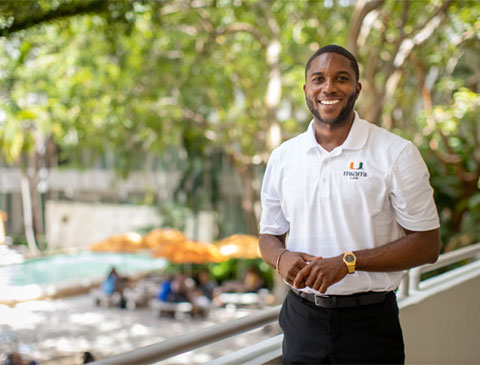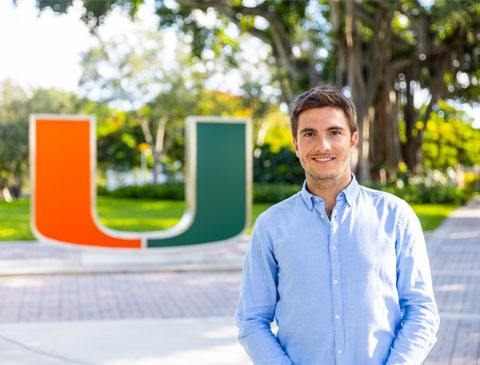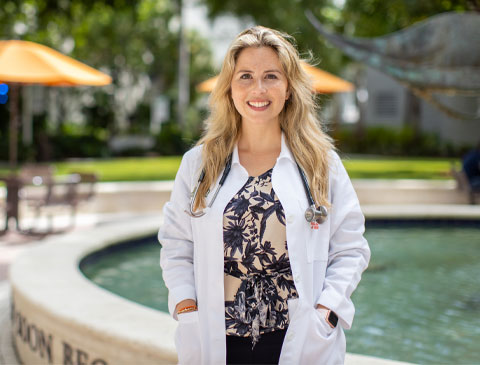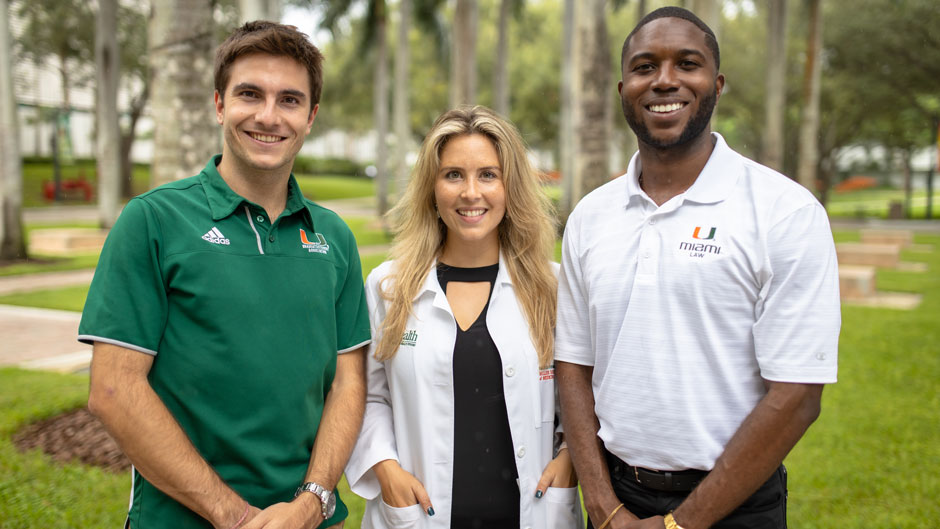Each of them is impacting the University of Miami.
Now, Alvaro Ruiz Emparanza, Octavious Buiey Jr., and Leah Colucci want to serve their constituents this academic year as president of the Graduate School, School of Law, and the Leonard M. Miller School of Medicine student associations, respectively.
The three serve as a liaison between the administration and the students they represent. From surgery rotations, to working at a criminal defense law firm, to conducting civil engineering research, they juggle all of this while maintaining their individual responsibilities with a similar mission: to increase graduate student involvement at the University.
Meet the graduate student leaders:
Octavious Buiey Jr., president of the Student Bar Association, School of Law
Buiey has been a voice for others since middle school when he was a member of his student government cabinet. Now a third-year law student, the North Florida native is passionate about making changes for all.
As Buiey stepped into his new role, one of his main priorities is “creating a student government that is focused on action.” He is also focused on creating a space for “happy and successful” lawyers as mental health awareness was at the forefront of his campaign platform.
“We wanted to create an avenue for all students to be involved,” said Buiey, an aspiring criminal defense lawyer. “We recently passed some constitutional amendments that have been in the works for years.”
One of those amendments is the creation of a transfer student seat on the senate.
“We have some transfer students and they are often times kind of forgotten. And we wanted to make their concerns heard,” said Buiey. “So, now as opposed to running against other 1Ls, 2Ls, or 3Ls, they now run against other transfer students. That’s big.”
Buiey is also focused on facilities for students in the School of Law. He recently met with Anthony E. Varona, the new dean of the School of Law. The two are working toward bringing a state-of-the-art courtroom into the School, to create a more authentic experience for future litigators to hone their skills.
“I think it’s a beautiful campus, but our space is a little outdated,” said Buiey. “One of the things we talk about is how can we update the law school to get it to match the quality of our law students.”
This year, Buiey also has plans to introduce the Toppel Career Center’s Sebastian’s Closet program, a free business professional clothing rental service for students to use for their interviews, to the School.
Alvaro Ruiz Emparanza, president of the Graduate Student Association, Graduate School
When he came to the University as a civil engineering Ph.D. candidate, Ruiz Emparanza didn’t anticipate being as heavily involved in leadership as he is—but as his academic career advanced, so did his involvement.
 “Compared to Europe, a lot of importance is placed on leadership,” said Ruiz Emparanza, a native of Legazpi, a little town in the Basque region of Spain, who first became involved with student government as a senator. “I have been heavily involved in the Graduate Student Association (GSA), Engineering Student Council and the UM American Concrete Institute student chapter, being the president of each of them at a certain point during my academic career at UM. Other leadership roles include being the Engineering Student ambassador, Graduate Student Representative and voting member at the Graduate Council. ”
“Compared to Europe, a lot of importance is placed on leadership,” said Ruiz Emparanza, a native of Legazpi, a little town in the Basque region of Spain, who first became involved with student government as a senator. “I have been heavily involved in the Graduate Student Association (GSA), Engineering Student Council and the UM American Concrete Institute student chapter, being the president of each of them at a certain point during my academic career at UM. Other leadership roles include being the Engineering Student ambassador, Graduate Student Representative and voting member at the Graduate Council. ”
In his role as the president of GSA, interacting with other students within the Graduate School is a priority for Ruiz Emparanza. On Sept. 7, he led efforts to host the GSA Kick Off Cruise, a networking event on a luxurious cruise around Miami for 300 graduate students.
“You don’t know who you’re going to meet while at one of our networking events,” said Ruiz Emparanza. “I’m trying to bring the idea that life is not only work. It’s about meeting people and being connected to others, it’s not just you and your advisor.”
Other important issues to Ruiz Emparanza are environmental awareness, political awareness, sharing research, and bridging a gap between the undergraduate and graduate community.
“I am passionate about the environment,” said Ruiz Emparanza, who as a child would get in trouble with his parents if he were caught not recycling. “Within GSA we are also planning beach clean-ups and are also collaborating with the City of Coral Gables to do a street clean up.”
Ruiz Emparanza will join forces with the undergraduate student government executives on a Homecoming event to bring undergraduates, graduates, and alumni together.
“I am trying to do more with them because we believe that we could benefit from each other,” he said. “They bring the energy and youthfulness, and we can serve as mentors.”
As his studies and campus involvement at UM progresses, Ruiz Emparanza credits time management as a major key to his success. When Ruiz Emparanza isn’t meeting with the administration on ways to better life for graduate students across all disciplines, he is searching for various solutions to extend the service life of infrastructures by using alternative reinforcing materials, such as composites, under the guidance of his advisors Antonio Nanni and Francisco De Caso from the Department of Civil, Architectural and Environmental engineering.
As Ruiz Emperanza’s final year comes to an end, he hopes to leave GSA better than he found it. He recently began to establish the groundwork for a public speaking academy for graduate students.
“Public speaking is a big part of research,” Ruiz Emparanza said. “Training students how to break down their research for people outside of your research to understand is important and necessary.”
Leah Colucci, president of the Leonard M. Miller School of Medicine Student Government
Third year medical student Leah Colucci said she was destined to be a ’Cane. In 2017, she earned a bachelor’s degree in neuroscience and marine science, and by 2021 she will be a triple alumna when she earns her master’s degree in genomic medicine in addition to a medical degree.
 “My mom was a huge fan of UM and would bring me to campus and take me to football games when I was a kid,” said Colucci, who also serves as student trustee on the University’s Board of Trustees. Her passion for UM and all it has to offer is evident to her peers and others.
“My mom was a huge fan of UM and would bring me to campus and take me to football games when I was a kid,” said Colucci, who also serves as student trustee on the University’s Board of Trustees. Her passion for UM and all it has to offer is evident to her peers and others.
“I am passionate about the opportunities of medical students as a whole,” said Colucci, a member of the Miller Mentor program, a collaboration between undergraduate and graduate students and the Miller School of Medicine that connects motivated premedical students with a medical student mentor.
“There’s all these students coming from different places so they didn’t have the same connection to the University that I had. In this role I was tasked with showing them all the different resources that we have to offer.”
Colucci’s friends encouraged her to run for president of the Miller School of Medicine Student Government. Her peers and Dr. Hilit Mechaber, the associate dean for student services, felt she was the perfect candidate for the role.
This semester, Colucci is working on a big task that will impact future generations of medical students at the Miller School of Medicine.
“One huge thing that is at the forefront of my mind and other students’ minds is radically changing our curriculum,” said Colucci. “I have been helping faculty by giving a lot of feedback. We are a top 50 medical school and we want to stay a top 50 medical school.”
Colucci’s people-oriented attitude and enthusiasm make her an ideal person for the job. She is constantly making sure students are aware of new and existing resources not just on the medical campus, but at the University.
“As president, I’m trying to connect our medical students to campus life so that they don’t feel like they’re just here to work and they don’t really become a part of the UM community,” she said. “It’s really sad when I come across a friend who is depressed, so we are constantly trying to update our wellness efforts as well.”

